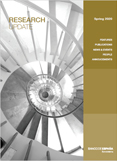
Series: Featured research.
Author: María Alejandra Amado.
Full document
Summary
Macroprudential FX regulation may reduce systemic risk; however, little is known about its unintended consequences. In this paper I study the implementation of a macroprudential FX tax by the Peruvian Central Bank. Using administrative data on the universe of formally registered firms, I show that a 10% increase in bank exposure to the policy increases the disparities in loan growth between small and large firms by 1.6 percentage points. When accounting for firms switching to local currency (soles) financing from different banks, the effect on large firms' debt is only compositional. Moreover, using data on the universe of FX contracts, I find that firms that are mostly affected by the policy are not hedged against exchange rate risk. Consistent with my empirical findings, I describe a mechanism in which currency mismatch acts as a means for relaxing small firms’ borrowing constraints and show that policies taxing dollar lending increase financing disparities between small and large firms.

